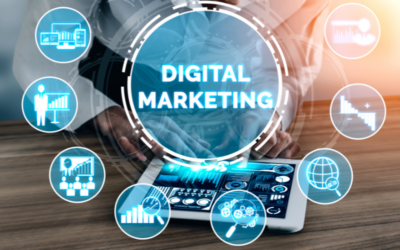Are you ready to unlock the full potential of your B2B business in the digital age? In a world where online connections drive success, the ability to create an exceptional B2B digital marketing strategy is a game-changer. But why is it so vital?
The answer is simple: a successful B2B digital marketing strategy isn’t a luxury; it’s a strategic advantage. In an age defined by digital interactions and online engagement, your company’s ability to connect, captivate, and convert in the digital realm can be the driving force behind your future success.
In this blog post, we’ll explore five pivotal strategies that will not only answer that question but also empower your company to thrive in the competitive world of B2B marketing. So, are you ready to take your business to new heights and master the art of digital success?
Understand Your Target Audience:
One of the fundamental pillars of any successful digital marketing strategy is understanding your target audience. In the B2B space, this entails recognizing the needs, challenges, and pain points of your potential clients. Conduct in-depth research to create detailed buyer personas, focusing on factors like job titles, industry, and company size. This knowledge will allow you to tailor your content and messaging to resonate with your ideal clients, increasing the chances of engagement and conversion.
Understanding your target audience is foundational because it informs every other aspect of your marketing strategy. In the B2B space, businesses often have a niche audience with specific needs and pain points. By knowing your audience, you can tailor your messaging, content, and solutions to address these specific challenges. This leads to higher engagement, better conversion rates, and stronger relationships with potential clients.
Create Valuable Content:
Content marketing is a core component of B2B digital marketing. By offering valuable and relevant content, you can position your business as an industry authority and build trust with your target audience. Develop a content strategy that includes blog posts, whitepapers, case studies, and webinars, among other formats. Ensure that your content addresses the unique challenges your audience faces, providing solutions and insights that can help them in their decision-making process.
Content is the currency of the digital world. Valuable content serves several purposes: it establishes your brand as an authority in your industry, attracts organic traffic through SEO, and provides value to your audience. B2B clients often have complex problems that require in-depth information. By offering valuable content, you can educate your audience and help them make informed decisions, ultimately building trust and loyalty.
Optimize for SEO:
Search engine optimization (SEO) is the cornerstone of a successful online presence. Effective SEO strategies can help your B2B business rank higher in search engine results pages, making it easier for potential clients to discover your offerings. This involves optimizing your website for relevant keywords, improving site speed and mobile-friendliness, and developing high-quality backlinks. A well-optimized website will not only attract more organic traffic but also enhance your brand’s credibility.
SEO is the backbone of online visibility. When potential clients search for solutions in your industry, you want them to find your business. SEO ensures that your website ranks well in search engine results, making it more likely for your target audience to discover your offerings. Higher visibility can lead to increased organic traffic and, when combined with quality content, can establish you as an authority in your niche.
Leverage Paid Search:
Paid search marketing, often through platforms like Google Ads, is a powerful tool in the B2B marketer’s arsenal. Pay-per-click (PPC) advertising allows you to target specific keywords and demographics, ensuring your message reaches the right audience. It’s a cost-effective way to generate leads and increase brand visibility. To succeed in paid search, conduct keyword research, create compelling ad copy, and continually refine your campaigns to achieve the best results.
Paid search is a highly targeted and cost-effective method for reaching your ideal B2B clients. By bidding on relevant keywords and demographics, you ensure that your message is placed in front of those actively searching for solutions. This is particularly important because B2B sales often involve long sales cycles. Paid search can provide a consistent flow of high-quality leads and prospects, which can be nurtured to conversion.
Harness Marketing Automation with HubSpot:
HubSpot is a versatile platform that can streamline your B2B digital marketing efforts. It offers features for email marketing, lead nurturing, analytics, and customer relationship management (CRM), all of which can help you automate and personalize your marketing campaigns. Implementing HubSpot can save time and improve the efficiency of your marketing processes while providing valuable insights into your customers’ behavior.
HubSpot, or similar marketing automation platforms, is essential for efficiency and personalization. In B2B marketing, nurturing leads and maintaining relationships are critical. Marketing automation can help in lead scoring, automated email marketing, and CRM integration. This ensures that you can engage with prospects at the right time, with the right content, and keep track of their interactions with your brand. Personalization and timely responses are crucial for nurturing leads and turning them into customers.
Developing a successful B2B digital marketing strategy involves understanding your audience, creating valuable content, optimizing for SEO, leveraging paid search, and harnessing the power of marketing automation with tools like HubSpot.
Whirlwind Media, as a B2B digital marketing agency, can assist in crafting and executing these strategies to drive your business forward. By focusing on these five key areas, you’ll be well on your way to achieving success in the competitive world of B2B digital marketing.



